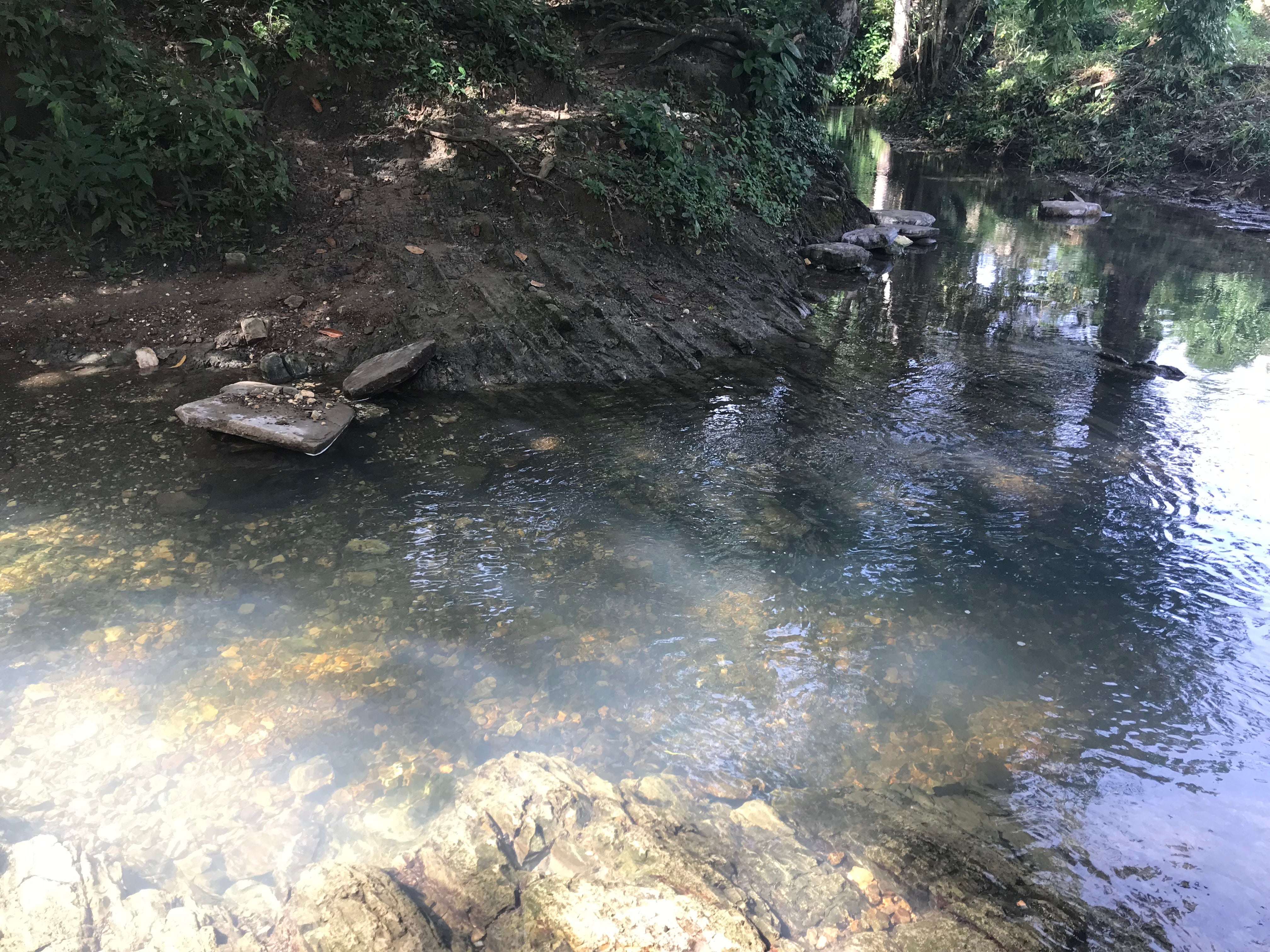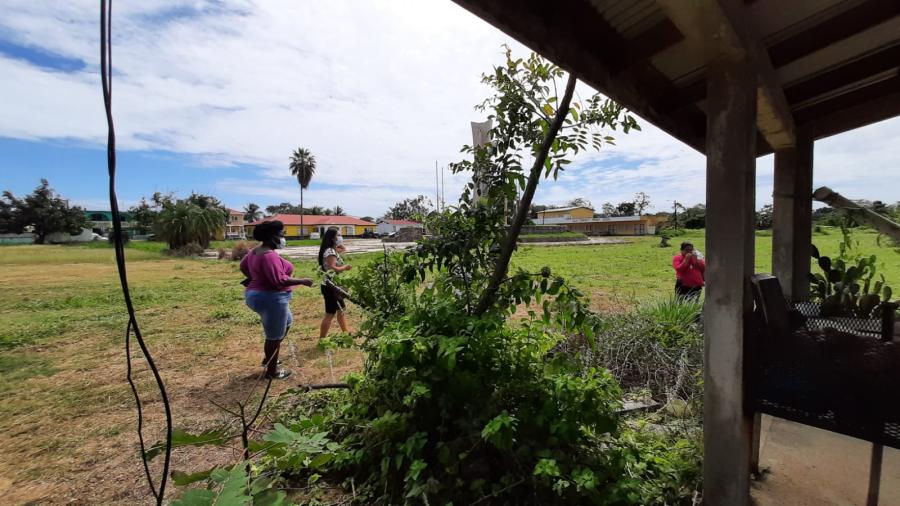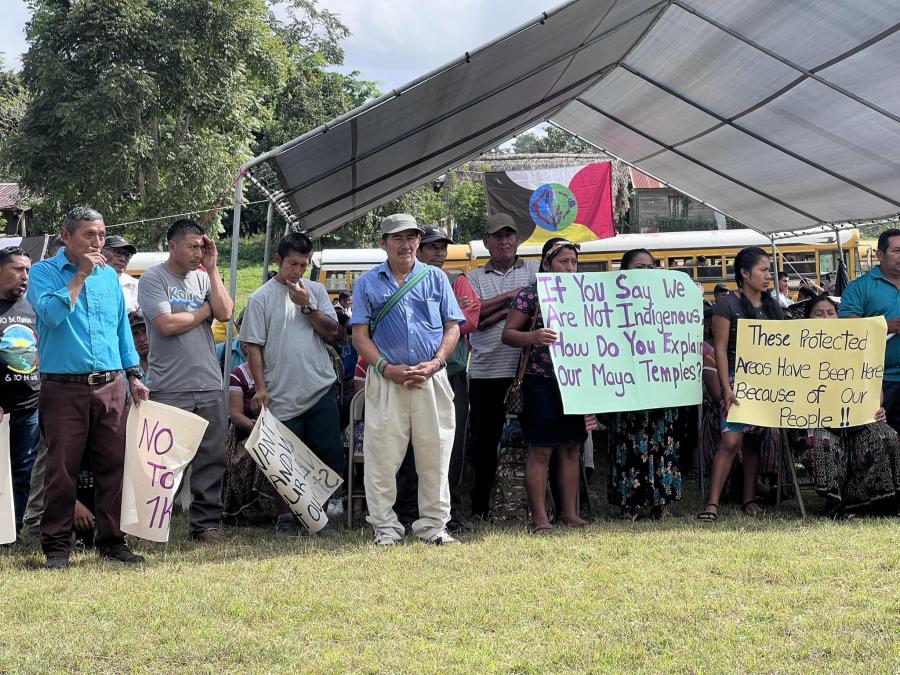By Monica Coc Magnusson (Q'eqchi Maya, CS STAFF)
The Maya Peoples of southern Belize have struggled for decades to have their identity as First Peoples recognized in Belize. They have fervently fought to maintain ownership of their ancestral territories, which they continue to use and occupy. For centuries, these territories were treated as terra nullius by colonial governments. Subsequent governments have lambasted Maya efforts to secure title to their homelands as balkanization. Nevertheless, the Maya Peoples of southern Belize remain resilient often in the face of great odds.
In 2015, the highest appellate court in Belize, the Caribbean Court of Justice (CCJ), rendered a landmark decision, known as the April 22, 2015 Consent Order, that affirmed the rights of the Maya Peoples of southern Belize to their lands and territories. Almost seven years later, implementation efforts seem to be at a standstill mostly because of the Belizean government’s lack of goodwill to implement the Consent Order in good faith. The Caribbean Court of Justice specifically ordered the State under paragraphs 2 and 3 of the Consent Order, “to protect the rights of the appellants and to do so in consultation with the Maya people or their representatives.”
The appellants in this case include the Toledo Alcaldes Association (TAA) and the Maya Leaders Alliance (MLA). The TAA is a collection of traditionally elected leaders from each Maya village, and the Maya Leaders Alliance, which provides the alcaldes (traditional leaders) with technical support, has spearheaded a campaign for the full recognition of the Maya as Indigenous Peoples in Belize. Their efforts have brought them to the Supreme Court of Belize several times, once in 2007 and again in 2010 after the government of Belize appealed a ruling that granted the Maya legal rights to their lands, and finally in 2015 to the apex court, the Caribbean Court of Justice. At all levels, the courts ruled in favor of Maya communities, culminating with the CCJ affirming that “Maya customary land tenure exists in the Maya villages in the Toledo District and gives rise to collective and individual property rights.”
These rulings should have set in motion a reversal of the government’s negative behavior towards its First Peoples in Belize. Instead, the government has gone to great lengths to circumvent its obligations to consult with the Maya people and their traditional authorities as required under the CCJ Order. The government-appointed an Indigenous person to chair the Maya Land Rights Commission, assigned to implement the Consent Order, and it created a Ministry of Indigenous Peoples Affairs. However, this is all lip service. These appointments were conducted without the consultation of the Maya communities. Recently, the Ministry of Indigenous Peoples Affairs and the Maya Land Rights Commission—the latter being the government body tasked with implementing the Consent order—unilaterally finalized and filed a Free, Prior and Informed Consent Protocol without the approval or consent of the Maya Leaders Alliance and the Toledo Alcaldes Association. This document was endorsed by the Belizean Cabinet and filed with the Caribbean Court of Justice. The CCJ retained supervisory jurisdiction over the implementation of the case.
To add insult to injury, the commissioner instructed the appellants to share the Protocol widely among communities, a document that has not been drafted with, or accepted by, Maya communities. The Maya Leaders Alliance and the Toledo Alcaldes Association have stated in response: “These actions erode the trust and confidence of the appellants that the government is genuinely committed to moving the implementation process forward. For over three decades, the Maya have struggled to correct injustices, marginalization, and top-down approaches. Yet, seven years after the confirmation of our rights, we continue to be ambushed and disrespected. Our governance system continues to be under attack with repeated attempts to overthrow the collective governance institution of the Maya people, the Toledo Alcaldes Association. We urge the government to immediately redress its current position and arrange for a proper and meaningful engagement with the appellants on the way forward with the implementation process.” The recent actions of the government of Belize can be interpreted either as a lack of appreciation for the principles of Free, Prior and Informed Consent, or a blatant reluctance to act in good faith towards the Maya Peoples of southern Belize.
Traditional Maya home.
Free, Prior and Informed Consent
The principle of Free, Prior and Informed Consent is enshrined in the United Nations Declaration on Rights of Indigenous Peoples Article 19, which states: “States shall consult and cooperate in good faith with the Indigenous Peoples concerned through their own representative institutions in order to obtain their Free, Prior and Informed Consent before adopting and implementing legislative or administrative measures that may affect them.” A State's duty to consult and to allow the participation of Indigenous Peoples in decisions making is also reflected in the International Labor Organization Convention 169’s Article 6, which states:“governments shall: (a) consult the peoples concerned, through appropriate procedures and in particular through their representative institutions, whenever consideration is being given to legislative or administrative measures which may affect them directly…”
Free, Prior and Informed Consent is protected under ILO 169 and the Declaration, where it is specifically mentioned five times in Articles 10, 11, 19, 28, and 29. The duty to consult is further reflected in Articles 19 and 32. ILO 169 Article 6 also requires that consultation with Indigenous Peoples be carried out through institutions that are representative of Indigenous communities and specifies that Indigenous people should control the process by which representatives are determined.
Free, Prior and Informed Consent, a standard protected by international human rights law, reinforces that “all peoples have the right to self-determination” and “all peoples have the right to freely pursue their economic, social, and cultural development.” Former UN Special Rapporteur on the Rights of Indigenous Peoples, James Anaya (Apache and Purépecha), in an interview with Indian Country Today, stated, “We need to…return to the origins of the discussion about [Free, Prior and Informed Consent having] to do with identifying Indigenous Peoples’ rights of self-determination…over lands and resources. With those rights come certain safeguards, and one of those safeguards is that those rights can’t be affected or impacted or diminished without consultation and Free, Prior and Informed Consent…[In] other parts of the world, companies or governments are saying, ‘Okay, we’re going to get your consent’… [but] very often not in the most equitable terms and very often in ways that diminish the rights of those involved.”
The UN Expert Mechanism on the Rights of Indigenous Peoples defined Free, Prior and Informed Consent as “one of the most important principles that Indigenous Peoples believe can protect their right to participation. It is embedded in the right to self-determination. The duty of States to obtain Indigenous Peoples’ FPIC entitles Indigenous people to effectively determine the outcome of decision-making that affects them, not merely a right to be involved.”
Grand Chief Edward John (Tl’azt’en) from Canada says, “In plain terms, FPIC is knocking on somebody’s door and asking for permission before you come in.” A central element of Free, Prior and Informed Consent is genuine inclusion, disclosure, and respect for Indigenous Peoples’ decision-making processes. “Many times Indigenous Peoples are accused of being anti-development, but the only claim Indigenous people are making is that they really want to be part of the decision-making,” says Stella Tamang (Tamang), Cultural Survival board member from Nepal. After centuries of exclusion, dispossession, and discrimination, Indigenous Peoples want their voices heard.
Under current international law, governments are obligated to consult Indigenous communities before any development affecting their lands and resources takes place, and even more broadly, any decisions directly affecting Indigenous Peoples and their self-determination require their consultation and consent. The final 2011 study on Indigenous Peoples and the right to participate in decision-making by the UN Expert Mechanism on the Rights of Indigenous Peoples advises on the proper implementation of Free, Prior and Informed Consent: “The element of ‘free’ implies no coercion, intimidation, or manipulation; ‘prior’ implies that consent is obtained in advance of the activity associated with the decision being made, and includes the time necessary to allow Indigenous Peoples to undertake their own decision-making processes; ‘informed’ implies that Indigenous Peoples have been provided all information relating to the activity and that that information is objective, accurate, and presented in a manner and form understandable to Indigenous Peoples; ‘consent’ implies that Indigenous Peoples have agreed to the activity that is the subject of the relevant decision, which may also be subject to conditions.”
Nicole Friederichs, Practitioner-in-Residence at the Human Rights and Indigenous Peoples Clinic at Suffolk University and a Cultural Survival board member, adds, “When you are talking about Free, Prior and Informed Consent, you are talking about the broader duty to consult and then the overarching principle of participation. The way I read [the Declaration] is that States have a duty to consult with Indigenous Peoples and the goal of consultations should be to obtain their Free, Prior and Informed Consent. Participation is about remedying centuries of denying Indigenous Peoples access to decision-making that was happening without their voice at all. This is a way to make sure that the States recognize they have an obligation to actually bring Indigenous people to the table and listen to them.”

Belize’s FPIC Obligations to Indigenous Peoples
Belize’s duty to uphold the right to Free, Prior and Informed Consent, as it relates to its Indigenous citizens, is grounded in both domestic and international human rights law. The series of Maya Land rights cases, including SATIIM et al v The Attorney General of Belize, et al, Supreme Court Claim 394 of 2013, upheld and affirmed the rights of Indigenous Peoples to Free, Prior and Informed Consent. The 2015 CCJ Consent Order in Maya Leaders Alliance v. Attorney General of Belize specifically orders the government to consult with the appellants and the chosen representatives of the Maya Peoples, who are the TAA and MLA representing the 39 Maya villages of southern Belize. The government of Belize also voted for the UN Declaration on the Rights of Indigenous Peoples, therefore, it is obligated under international law to uphold the right to Free, Prior and Informed Consent.
Unfortunately, Free, Prior and Informed Consent is too commonly misinterpreted, improperly applied, or not carried out altogether. Belize has a historic pattern of ignoring its duty to consult its Indigenous Peoples. In the 1990s, it granted logging concessions on traditional Maya territories to foreign-owned companies without prior consultations and without approval from these communities. When the State’s actions were criticized, it argued that it could not be expected to consult when it was unclear with whom it should be consulting, as there were just “too many Maya organizations.” In direct response to the excuses, Maya Peoples of southern Belize formed an umbrella alliance now known as the Maya Leaders Alliance, of which the traditional customary authorities, the TAA alcaldes, are a member, for the specific purpose of engaging with the State government on issues related to land tenure security. The State is fully aware of this and ought not be confused about whom to consult.
Given repeated experiences wherein the duty to consult is either ignored or not properly applied, in 2014, the Maya people, with the assistance of the MLA and TAA, created their own consultation framework, known as the Maya Consultation Framework (MCF). This was also important as threats to their traditional territories from speculators, extractive industries, and conservation groups were on the rise. On June 13, 2014, the completed MCF was adopted and endorsed by the 39 Maya villages. The MCF, is grounded on the principles of international human rights laws, took several years to develop as it reflects numerous hours of dialogue among the alcaldes and community members. It illustrates the current and existing ways of traditional engagement in the Maya communities of southern Belize.
The MCF was shared with the government of Belize on numerous occasions. The previous government administration even asked Maya leaders whether it could use it as a template to develop a broader Free, Prior and Informed Consent Protocol that it was working on with the TAA and MLA as required under the 2015 CCJ Consent Order. However, in 2020, the government administration changed. The new administration recently abrogated the former administration’s FPIC Protocol that it was working on with the Maya. It instead created a FPIC document unilaterally and without the consent of the Maya Peoples.
The newly created Maya of Southern Belize Free, Prior and Informed Consultation Protocol, as the government calls it, does not reflect Maya customary decision-making processes. Also problematic is that it replaces the word “consent” with “consultation,” which is a cause for concern. The Maya Leaders Alliance states, “There are really two sticking points that we see in the protocol: the government defining Maya institutions and processes which international standards reject for governments to do; and the blurring of the entire FPIC process by calling it a Consultation Protocol rather than a Consent Protocol. We are particularly aiming for the Court to intervene in clarifying this in the text of the draft submitted by the government. ”
The government’s consultation protocol is simplistic and does not meet the minimum standards required under international law in the application of Free, Prior and Informed Consent protocols. As pointed out above, it is not for the government to define the Maya Peoples' institutions or decision-making processes. Under international human rights law, Indigenous Peoples have a right to self-determination which includes defining engagement with their communities on their own terms, a right to autonomy, self-governance, and a right to maintain and strengthen their own institutions (UNDRIP Articles 3,4,5,31).
Secondly, by replacing the word “consent” with “consultation,” whether intentional or not, confounds the process of FPIC and in so doing makes it appear that the ultimate goal is not about obtaining voluntary uncoerced permission or approval of the communities. The word Consultation is really just discussion without the ultimate goal of acquiring an agreement or permission. However, Consent involves giving permission, approval, assent, or agreement with a proposition. The current FPIC document as drafted by the state, in respect of the steps of consultation, seems to take away the negotiating power of the community prior to the end of the consultation process. This is dangerous because communities will be left to the mercy of the proponent before the consultation process is completed, and the government will have washed its hands of its obligations to obtain the FPIC of the communities. A more just and equitable approach is that consent is FINAL only when the community and the proponent have reached a consent agreement at the end of the consultation process and that nothing should commence until then. The Maya leaders are hopeful that the CCJ will intervene to clarify these problematic aspects of the current protocol as propounded by the government, and order the government to adhere to international standards of FPIC.
In February 2022, the Ministry of Indigenous Affairs embarked on a three-day consultation with some Maya villages and some NGOs that support its agenda to share the new protocol. However, it refused to engage with the traditional authorities, the TAA, prior to arranging these meetings claiming that they do not need the permission of the traditional authorities. This “consultation” amounted to calling last-minute meetings in villages, talking down to folks in non-Indigenous languages about what they have done, and not asking whether communities consent to the new protocol. If this is emblematic of their idea of consulting, this is indeed problematic. It illustrates the government’s lack of appreciation for authentic Free, Prior and Informed Consent protocols and it illustrates its reluctance of implementing the Maya land rights order in good faith. The government’s actions reflect clear divide and conquer tactics aimed at sabotaging Maya land rights implementation. The continued narrative of the State is one of balkanization, claiming that Maya Belizeans want special rights whenever they assert their legally enshrined rights to self-determination as the traditional Maya Leaders have done for decades.
Belize is among many governments who pay lip service to the UN Declaration on the Rights of Indigenous Peoples, but as Grand Chief John says, “when the issue of land rights comes to the fore, suddenly people start backing off and saying, ‘hey, wait just a minute, we didn’t mean that you people have any rights to your land. We stole it fair and square, and you don’t have it anymore.’ That’s why I come back to the Declaration, as a remedial instrument to right the wrongs of the past; these rights are recognized in an international instrument to the UN. These rights, and these processes containing their rights, are designed to remedy the historic injustices.”
Nevertheless, Belize has a unique opportunity to set an example for the global community in respecting the rights of Indigenous Peoples. However, it must change its ways and colonial mentality towards Indigenous communities. Former Special Rapporteur, James Anaya’s, says it best, in commenting about the Maya consultation protocol, “following this framework would increase efficiency and use of resources by creating a streamlined process of implementation of the court orders weighing on Belize’s shoulders and for other development and or conservation initiatives...if the government of Belize chooses to meaningfully engage the Maya people in accordance with their Consultation Framework, it may even establish itself as among one of the first nation states to honor its duty to consult within a human rights framework, a feat sure to garner international prestige among the international human rights legal community.”
All photos by Monica Coc Magnusson. Top photo: Traditional Maya community meeting led by the alcalde, traditional Maya leader. Community members attend, including women and children.


